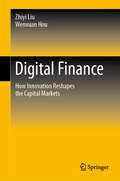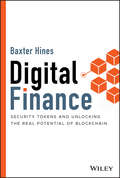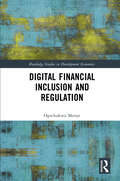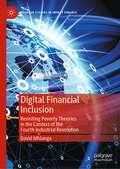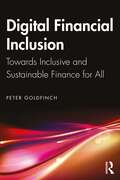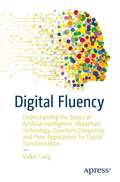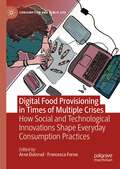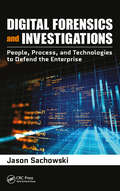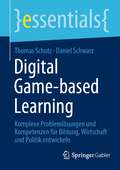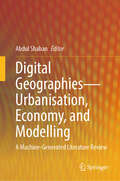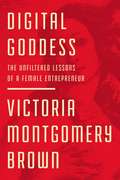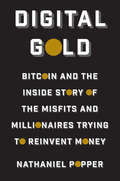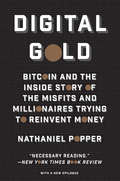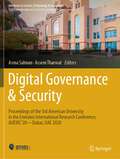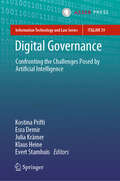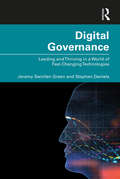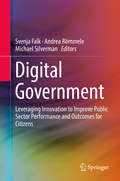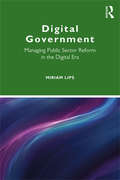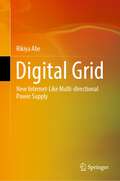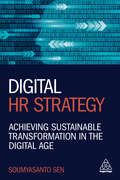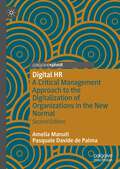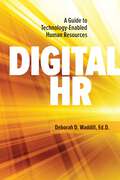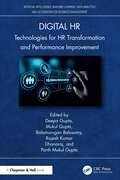- Table View
- List View
Digital Finance: How Innovation Reshapes the Capital Markets
by Wenxuan Hou Zhiyi LiuThis book presents an overview of the development of digital finance. It covers various aspects of digitalfinance, including its definition, evolution, and importance in modern economics. It explores the interdisciplinary perspective of digital finance and its relationship with capitalism, and discusses the key factors influencing the development of digital finance, as well as the challenges and opportunities it faces. It also offers practical insights into digital finance, such as the innovative digital financial models andplatforms and the strategies of digital transformation in commercial banks. What is new about this approach is that the book takes a holistic view of digital finance, covering not only its economic and financial aspects but also its social and environmental impacts. It also offers a critical evaluation of the challenges and opportunities in digital finance from a global perspective. In this book, authors look into the impact of digital finance in various fields, such as monetary theory, wealth management, central bank digital currency, international monetary system, and network security and data privacy.
Digital Finance: Security Tokens and Unlocking the Real Potential of Blockchain
by Baxter HinesExplores how the financial industry will be affected by developments in blockchain and cryptocurrencies at the dawn of a new digital age in finance Our financial system is in the midst of a digital revolution. Blockchain, viewed by many experts as “the most important invention since the Internet,” has changed the way we exchange value and information. Although most people are aware of Bitcoin and other cryptocurrencies, few understand how security tokens—digitized forms of traditional ownership certificates—can drive blockchain to reach its fullest potential by offering investors features and innovations that are simply not possible with paper certificates. Digital Finance: Security Tokens and Unlocking the Real Potential of Blockchain explains how the integration of blockchain and security token technology will transform the current financial infrastructure and radically improve efficiency, transparency, and security. Using clear language and an easy-to-follow framework, author Baxter Hines draws upon his decades’ experience in the financial industry to address how the digitization of assets will drive cost reductions, enhance flexibility, and pave the way for new business models and revenue streams for years to come. Filled with real-world case studies and expert insights on the latest opportunities and trends, such as the COVID-19 pandemic’s role in accelerating the adoption of blockchain, this must-have resource: Shows how blockchain and distributed ledger technology are disrupting the financial industry Explains what security tokens are and why they are the next major breakthrough for investing Highlights how blockchain technology has created new and more efficient ways of fund raising and investing Identifies the ways companies like IBM, Fidelity Investments, and AXA are deploying blockchain and tokenized solutions Describes how assets only available to institutional investors could become marketed to the mainstream Discusses the impact that security tokens will have on real assets such as stocks, real estate, bonds, and derivatives Provides insight into how central banks around the world are embracing blockchain and beginning to issue digital currencies Digital Finance: Security Tokens and Unlocking the Real Potential of Blockchain is essential reading for financial professionals, general investors, finance and technology students, regulators, legal professionals, and users of cryptocurrency and blockchain technology.
Digital Financial Inclusion and Regulation (Routledge Studies in Development Economics)
by Ogochukwu MonyeThis book explores the various considerations for achieving an effective regulatory strategy to improve financial access and usage in Nigeria and beyond. Gaps in the legal and institutional framework for digital financial services (DFS) as well as the barriers that contribute to financial exclusion are identified as are the policy changes needed to provide more extensive, accessible and sustainable financial inclusion value. In addition, the book covers divergent themes around the use of and insights for regulating industry financial services providers and challenger entities that herald industry disruption. The book adopts three research methods. The doctrinal research method is used to buttress the law and development analysis and the themes around regulation, adoption and usage of financial services. To elucidate the application of financial innovations, comparative case studies are drawn from selected jurisdictions including Kenya, South Africa, Ghana, The Philippines, Brazil, Mexico, Uganda, Pakistan, India, and Bangladesh. Lastly, using the empirical research method, the author reports the burden experienced by the residents of a community without banks in accessing finance. Included in this discussion are the barriers to finance as well as the coping strategies adopted by the community residents to access formal and informal finance.
Digital Financial Inclusion and Regulation (Routledge Studies in Development Economics)
by Ogochukwu MonyeThis book explores the various considerations for achieving an effective regulatory strategy to improve financial access and usage in Nigeria and beyond. Gaps in the legal and institutional framework for digital financial services (DFS) as well as the barriers that contribute to financial exclusion are identified as are the policy changes needed to provide more extensive, accessible and sustainable financial inclusion value. In addition, the book covers divergent themes around the use of and insights for regulating industry financial services providers and challenger entities that herald industry disruption. The book adopts three research methods. The doctrinal research method is used to buttress the law and development analysis and the themes around regulation, adoption and usage of financial services. To elucidate the application of financial innovations, comparative case studies are drawn from selected jurisdictions including Kenya, South Africa, Ghana, The Philippines, Brazil, Mexico, Uganda, Pakistan, India, and Bangladesh. Lastly, using the empirical research method, the author reports the burden experienced by the residents of a community without banks in accessing finance. Included in this discussion are the barriers to finance as well as the coping strategies adopted by the community residents to access formal and informal finance.
Digital Financial Inclusion: Revisiting Poverty Theories in the Context of the Fourth Industrial Revolution (Palgrave Studies in Impact Finance)
by David MhlangaThis book is unique in that it challenges scholarly views on financial inclusion and poverty reduction while also relating financial inclusion and poverty reduction to the Fourth Industrial Revolution. The book deviates from the usual method of analyzing financial inclusion, which relies on bank accounts or microcredit as success criteria, and instead discusses how the Fourth Industrial Revolution is facilitating digital financial inclusion. With a five-fold goal, this book investigates both past and present readings and understandings of poverty and financial inclusion. To begin, it provides a thorough introduction to the Fourth Industrial Revolution and financial inclusion in the context of the Fourth Industrial Revolution. Second, the book dives quite extensively into the theories of financial inclusion in the context of the Fourth Industrial Revolution. Third, the book reconstructs the theory of financial inclusion, moving from traditional to digital financial inclusion, highlighting the role of digital financial inclusion in the transition from an informal financial money market to a formal financial system. The fourth goal is to evaluate the tools and effects of digital financial inclusion on poverty. Finally, it provides case studies of digital financial inclusion and the future of digital financial inclusion in emerging and developing countries. This book will be of interest to academics, students and practitioners in a range of disciplines, including finance, development economics, and consumer economics.
Digital Financial Inclusion: Towards Inclusive and Sustainable Finance for All
by Peter GoldfinchWith the arrival of the ‘Internet of Things’ (IoT), smartphones, real-time payments systems, plus FinTech activity, Financial Inclusion services can now be integrated into a country’s National Payment System (NPS), which means there should be no systemic barriers to transitioning the socio-economic pyramid, as actors build their financial status. This, however, is not the case. This book is a comprehensive guide to understanding the transition of financial services from cash-based to digital-based systems, with a focus on Financial Inclusion.It explores the success of Financial Inclusion programs in promoting economic activity and lifting people out of poverty. It does not concentrate on a single deployment or approach, rather, it takes a broader view. The book surveys the technology and infrastructure required to build digital payment systems, as well as the regulatory and governance frameworks that enable their operation, however, the major focus is on the incorporation of these financial services within communities in order to deliver social outcomes. The book opens the conversation, proposing a new method of measuring Financial Inclusion. It takes a critical but constructive look at the field over the last 20+ years and discusses the key learnings. It examines the Kenya mobile money approach to Financial Inclusion, compared with the Indian bank lead approach, and delivers a broad-based plan on how the programs can be more effective in the future.Financial Inclusion requires a pathway to progress, through a period of technology transformation. The foundation is provided by this book and the reader, on finishing it, will have a comprehensive appreciation of the subject matter.
Digital Fluency: Understanding the Basics of Artificial Intelligence, Blockchain Technology, Quantum Computing, and Their Applications for Digital Transformation
by Volker LangIf you are curious about the basics of artificial intelligence, blockchain technology, and quantum computing as key enablers for digital transformation and innovation, Digital Fluency is your handy guide. The real-world applications of these cutting-edge technologies are expanding rapidly, and your daily life will continue to be affected by each of them. There is no better time than now to get started and become digitally fluent.You need not have previous knowledge of these versatile technologies, as author Volker Lang will expertly guide you through this digital age. He illustrates key concepts and applications in numerous practical examples and more than 48 catchy figures throughout Digital Fluency. The end of each chapter presents you with a helpful implementation checklist of central lessons before proceeding to the next. This book gets to the heart of digital buzzwords and concepts, and tells you what they truly mean. Breaking down topics such as automated driving and intelligent robotics powered by artificial intelligence, blockchain-based cryptocurrencies and smart contracts, drug development and optimization of financial investment portfolios by quantum computing, and more is imperative to being ready for what the future of industry holds. Whether your own digital transformation journey takes place within your private or public organization, your studies, or your individual household, Digital Fluency maps out a concrete digital action plan for all of your technology and innovation strategy needs.What You Will Learn Gain guidance in the digital age without requiring any previous knowledge about digital technologies and digital transformationGet acquainted with the most popular current and prospective applications of artificial intelligence, blockchain technology, and quantum computing across a wide range of industries including healthcare, financial services, and the automobile industryBecome familiar with the digital innovation models of Amazon, Google, Microsoft, IBM, and other world-leading organizations Implement your own digital transformation successfully along the eight core dimensions of a concrete digital action planWho This Book Is ForThought-leaders, business executives and industry strategists, management and strategy consultants, politicians and policy makers, entrepreneurs, financial analysts, investors and venture capitalists, students and research scientists, as well as general readers, who want to become digitally fluent.
Digital Food Provisioning in Times of Multiple Crises: How Social and Technological Innovations Shape Everyday Consumption Practices (Consumption and Public Life)
by Francesca Forno Arne DulsrudThis edited collection brings together theoretical and empirical reflections on the role played by new technology and digital platforms in the provision of food. The way food is produced, distributed, consumed and disposed has significant consequences for the environment, affecting soil fertility, water and air quality, the state of the climate and the loss of biodiversity. Such negative effects are strictly related to the agro-industrial system of production and consumption, based on logic of low prices, high availability and high waste.This collection brings together a carefully curated range of insights from a team of twenty researchers coming from different fields working in different European universities engaged in the same project for more than three years. As a result, this book will appeal to people working on food studies and on sustainable food production and consumption, offering both conceptual-theoretical insights into contemporary food issues alongside empirical illustrations.
Digital Forensics and Investigations: People, Process, and Technologies to Defend the Enterprise
by Jason SachowskiDigital forensics has been a discipline of Information Security for decades now. Its principles, methodologies, and techniques have remained consistent despite the evolution of technology, and, ultimately, it and can be applied to any form of digital data. However, within a corporate environment, digital forensic professionals are particularly challenged. They must maintain the legal admissibility and forensic viability of digital evidence in support of a broad range of different business functions that include incident response, electronic discovery (ediscovery), and ensuring the controls and accountability of such information across networks. Digital Forensics and Investigations: People, Process, and Technologies to Defend the Enterprise provides the methodologies and strategies necessary for these key business functions to seamlessly integrate digital forensic capabilities to guarantee the admissibility and integrity of digital evidence. In many books, the focus on digital evidence is primarily in the technical, software, and investigative elements, of which there are numerous publications. What tends to get overlooked are the people and process elements within the organization. Taking a step back, the book outlines the importance of integrating and accounting for the people, process, and technology components of digital forensics. In essence, to establish a holistic paradigm—and best-practice procedure and policy approach—to defending the enterprise. This book serves as a roadmap for professionals to successfully integrate an organization’s people, process, and technology with other key business functions in an enterprise’s digital forensic capabilities.
Digital Game-based Learning: Komplexe Problemlösungen und Kompetenzen für Bildung, Wirtschaft und Politik entwickeln (essentials)
by Thomas Schutz Daniel SchwarzDieses essential erläutert, wie Digital Game-based Learning zur Lern-Revolution der Digitalisierung beiträgt. Lehrende und Game-Designer erschaffen Lernwelten, in denen Lernende sich größtmöglichen Herausforderungen stellen, unbekannte Welten selbst erkunden, zielführende Lösungen entwickeln und dabei unvergessliche Lernerfahrungen machen. Hierbei werden analoge und digitale Kompetenzen entwickelt, welche nicht nur in Krisenzeiten und in virtuellen Welten essentiell sind, um komplexe Probleme zu lösen.
Digital Geographies—Theory, Space, and Communities: A Machine-Generated Literature Review
by Abdul ShabanThis machine-generated volume, with chapter introductions by the human expert, showcases how digital technologies are having deep transformative impacts on geographies and temporalities of social, political, economic, and personal lives. They are altering perceptions and physicality of space and time. They are giving birth to digital communities and societies where distance remains of little significance. Virtual spaces and ICT have disrupted state sovereignties, often liquidating their physical national boundaries. The rise of the digital economy shows that new important raw materials for the future are information rather than coal, oil, and minerals. Digitalisation is also leading to several contradictory processes of democratisation, rising welfare of the citizens, as well as surveillance, peripheralisation and exclusion. States are taking pride in digitalising their services to the citizens, with massive consequences on the welfare of those facing digital divides. As a departure to, and in addition to, the usual understanding of digitalisation, society, and space, the present volume engages with some of the critical questions while reviewing existing literature: What are the space relations of digital technologies? What are the forms and consequences of changing physical space–human relations to digital-space-human relations? How is the sense of time and space changing with pervasive performatives of ‘in real-time’ and ‘virtual realities’ or with perceptible or portable spaces? In what ways does digitalisation relate to knowledge and power? Why and how must we theorise the digitalisation-led transformative processes of sociality, materiality and their spatialities? The book will be useful for teachers, researchers, and students engaged in this new area of digital geography, especially in social science and its subfields of sociology, economics, political sciences, anthropology, psychology, development studies, policy studies, social work, urban studies, and planning. For the full picture, the volume can be read in combination with its companion volume on ‘Digital Geographies – Urbanisation, Economy and Modelling’.
Digital Geographies—Urbanisation, Economy, and Modelling: A Machine-Generated Literature Review
by Abdul ShabanThis machine-generated volume, with chapter introductions by the human expert, of summaries of the existing studies furthers our understanding of the impact of digitalisation on spaces, their imaginations and representations. It brings out the digital territorial and socio-economic digital modelling and representation methods. The virtual spaces, created by GIS, photoshopping, games, etc., have become an area of interest for many as they produce spatial imaginaries having social, political and individual consequences. It delves into the literature on digital capitalism and how it is giving birth to a new mode of expansionary capitalism to reap the surplus values and profits from peripheries and drain the same to the core. It shows how digitalisation has enabled enterprises to operate from a virtual space with strong spatial networks. Mega digital enterprises together control a trillion-dollar economy having massive consequences for digital labour, welfare of consumers, and development geographies. This book explores some critical questions while generating summaries of existing literature: How do imaginaries, models or virtual realities help us comprehend spatialities? How does capitalism relate to digitalism, and with what consequences? How do the cities and mobilities relate to digitalisation? What are the possibilities of re-configuring the man-environmental relations with digital technologies in view of rising pollution and impending climate change? Teachers, researchers, and students engaged in this new area of digital geography, especially in social science and its subfields of sociology, economics, political sciences, anthropology, psychology, development studies, policy studies, social work, urban studies, and planning, will find the volume very useful. For a full picture, the book can be read in combination with its companion volume on ‘Digital Geographies – Theory, Space and Communities’.
Digital Goddess: The Unfiltered Lessons of a Female Entrepreneur
by Victoria R. Montgomery BrownWith women leading only twenty-four Fortune 500 companies, female founders receiving only 2.2 percent of US venture capital, and the continued presence of sexual harassment and double standards, the gender gap continues to hinder the advancement of women in the professional world. In Digital Goddess, Montgomery-Brown—founder of Big Think, a collection of experts across all fields and disciplines that are either at the top of their field or disrupting it, shares her story in an entertaining and educational light. Told from the unique, female entrepreneurial perspective that unpacks all the hurdles other female founders may face in their own journey to the top, Montgomery-Brown shares the real-world lessons she’s learned along the way, such as: Never lie to your investors, even when you just got arrested. Raising money is a poker game—learn how to play. The power and money still lie with men. Pretending it’s not that way, or being angry about it, won’t lead to success. Your relationship with your co-founder is like a second marriage, so forget about keeping the personal out of the workplace. The more authentic you are, and the more fun you have, the better your experience will be. This book is about dealing with the way things are, even when you don’t like it, and being yourself, even when it seems like a drawback. It’s about sucking it up, making the hard choices, and dealing with the consequences. It’s about being honest no matter what is going down. Victoria’s been called “the anti-Elizabeth Holmes,” for a good reason—unlike the ill-fated Theranos CEO, she&s transparent with her investors even when she fears they will walk away. Digital Goddess is a story for entrepreneurial women at any stage of life who want to know what it actually takes to build a business in a world that’s not always fair, predictable, or politically correct
Digital Gold
by Nathaniel PopperBitcoin, the landmark digital money and financial technology, has spawned a global social movement with utopian ambitions. The notion of a new currency, maintained by the computers of users around the world, has been the butt of many jokes, but that has not stopped it from growing into a technology worth billions of dollars, supported by the hordes of followers who have come to view it as the most important new idea since the creation of the internet.Believers from Beijing to Buenos Aires see the potential for a financial system free from banks and governments, and a new global money for the digital age. An unusual tale of group invention, Digital Gold tells the story of the colorful characters who have built Bitcoin, including a Finnish college student, an Argentinian millionaire, a Chinese entrepreneur, Tyler and Cameron Winklevoss, Bitcoin's elusive creator, Satoshi Nakamoto, and the founder of the Silk Road online drug market, Ross Ulbricht.With Digital Gold, New York Times reporter Nathaniel Popper offers a brilliant and engrossing account of this new technology--one filled with dramatic booms and busts that have led to untold riches for some and prison terms for others. But at each step of the way, Bitcoin has provided one of the most fascinating tests of how money works, who benefits from it, and what it might look like in the future.
Digital Gold: Bitcoin and the Inside Story of the Misfits and Millionaires Trying to Reinvent Money
by Nathaniel PopperA New York Times reporter&’s &“vivid&” account of the dramatic rise of Bitcoin and how it has led to untold riches for some—and prison terms for others (Financial Times). Shortlisted for the Financial Times and McKinsey Business Book of the YearA New York Times Book Review Editor&’s Choice The notion of a new currency, maintained by the computers of users around the world, has been the butt of many jokes, but that has not stopped it from growing into a technology worth billions of dollars, supported by the hordes of followers who have come to view it as the most important new idea since the creation of the Internet. Believers from Beijing to Buenos Aires see the potential for a financial system free from banks and governments. More than just a tech industry fad, Bitcoin has threatened to decentralize some of society&’s most basic institutions. An unusual tale of group invention, Digital Gold charts the rise of the Bitcoin technology through the eyes of the movement&’s colorful central characters, including an Argentinian millionaire, a Chinese entrepreneur, Tyler and Cameron Winklevoss, and Bitcoin&’s elusive creator, Satoshi Nakamoto. &“Engrossing.&” —Library Journal &“An elegant, thrilling tour-de-force. . . .The fast-paced action never stops.&” —William D. Cohan, New York Times–bestselling author of Power Failure
Digital Governance & Security: Proceedings of the 3rd American University in the Emirates International Research Conference, AUEIRC'20—Dubai, UAE 2020 (Advances in Science, Technology & Innovation)
by Asma Salman Assem TharwatThis book, and the papers published within it, delves into the topic of governance in a modern, digital age, deliberating upon digital finance, societal security, and digital governance, proving essential to governmental institutions, policymakers, economists, and finally, social educators. The formation of a prosperous and resilient society is, without a doubt, a daunting, monumental task. Addressing people’s needs, maintaining their well-being, ensuring safety from external threats, and implementing a just law system that covers contemporary ways of life are no simple task. Thankfully, the advent of technological advancement helps lighten the heavy burden of governance. The element of interconnectedness brought forward by technological innovation has bridged the gap between society and government, allowing for faster interactions through the digitalization of naturally bureaucratic processes, and the utilization of digital finances.
Digital Governance: Confronting the Challenges Posed by Artificial Intelligence (Information Technology and Law Series #39)
by Klaus Heine Kostina Prifti Esra Demir Julia Krämer Evert StamhuisThis book explores the structure and frameworks of digital governance, focusing on various regulatory patterns, with the aim of tackling the disruptive impact of artificial intelligence (AI) technologies. Addressing the various challenges posed by AI technologies, this book explores potential avenues for crafting legal remedies and solutions, spanning liability of AI, platform governance, and the implications for data protection and privacy. The book is valuable for audiences with or without a technological background. Primarily, it targets academic scholars from a variety of disciplines, including law, ethics, sociology, political science, economics, computer science, and engineering. Particularly, academics interested in interdisciplinary and transdisciplinary studies would benefit from the mixture of disciplines in the book. The scholarly insights in this work are valuable also for policymakers and civil society, by providing potential guidance for effective AI regulation. Additionally, the book can be useful to private companies and organisations that are involved in designing AI applications, offering practical insights and guidance about the legal and societal implications of AI. Kostina Prifti, Esra Demir and Julia Krämer are PhD candidates at Erasmus School of Law, Rotterdam, the Netherlands. Klaus Heine is Professor of Law and Economics at Erasmus School of Law, Rotterdam, the Netherlands. Evert Stamhuis is Professor of Law and Innovation at Erasmus School of Law, Rotterdam, the Netherlands. Chapter 2, Chapter 6, Chapter 10, and Chapter 13 are available open access under a via link.springer.com.
Digital Governance: Leading and Thriving in a World of Fast-Changing Technologies
by Stephen Daniels Jeremy Swinfen GreenDigital Governance provides managers with a simple and jargon-free introduction to the impact that digital technology can have on the governance of their organisations. Digital technology is at the heart of any enterprise today, changing business processes and the way we work. But this technology is often used inefficiently, riskily or inappropriately. Worse perhaps, many organisational leaders fail to grasp the opportunities it offers and thus fail to "transform" their organisations through the use of technology. This book provides an explanation of the basic issues around the opportunities and risks associated with digital technology. It describes the role that digital technology can play across organisations (and not just behind the locked doors of the IT department), giving boards and top management the insight to develop strategies for investing in and exploiting digital technology as well as arming them with the knowledge required to ask the right questions of specialists and to detect when the answers given are evasive or irrelevant. International in its scope, this essential book covers the fundamental principles of digital governance such as leadership, capability, accountability for value creation and transparency of reporting, integrity and ethical behaviour.
Digital Government: Leveraging Innovation to Improve Public Sector Performance and Outcomes for Citizens
by Svenja Falk, Andrea Römmele and Michael SilvermanThis book focuses on the implementation of digital strategies in the public sectors in the US, Mexico, Brazil, India and Germany. The case studies presented examine different digital projects by looking at their impact as well as their alignment with their national governments’ digital strategies. The contributors assess the current state of digital government, analyze the contribution of digital technologies in achieving outcomes for citizens, discuss ways to measure digitalization and address the question of how governments oversee the legal and regulatory obligations of information technology. The book argues that most countries formulate good strategies for digital government, but do not effectively prescribe and implement corresponding policies and programs. Showing specific programs that deliver results can help policy makers, knowledge specialists and public-sector researchers to develop best practices for future national strategies.
Digital Government: Managing Public Sector Reform in the Digital Era (Routledge Masters in Public Management)
by Miriam LipsDigital Government: Managing Public Sector Reform in the Digital Era presents a public management perspective on digital government and technology-enabled change in the public sector. It incorporates theoretical and empirical insights to provide students with a broader and deeper understanding of the complex and multidisciplinary nature of digital government initiatives, impacts and implications. The rise of digital government and its increasingly integral role in many government processes and activities, including overseeing fundamental changes at various levels across government, means that it is no longer perceived as just a technology issue. In this book Miriam Lips provides students with practical approaches and perspectives to better understand digital government. The text also explores emerging issues and barriers as well as strategies to more effectively manage digital government and technology-enabled change in the public sector. Digital Government is the ideal book for postgraduate students on courses in public administration, public management, public policy, political science and international relations, and e-government. It is also suitable for public service managers who are experiencing the impact of digital technology and data in the public sector.
Digital Grid: New Internet-Like Multi-directional Power Supply
by Rikiya AbeThis book is about Digital Grids, which eliminate the electrical constraints of power grids, provide a mechanism for free electricity trading, make full use of renewable energy, and remove human energy constraints. It is rare to experience an era of great change that shakes the social structure. The great transformation of the social structure brought about by the Internet is just one of them. It is doubtful that people at the time when that transformation began could realize just how great and momentous the change would be, but now all indications are that the energy industry will bring about a major transformation of the social structure. This book, The Digital Grid, aims to show the far-reaching effects of that concept and how it will be realized.
Digital HR Strategy: Achieving Sustainable Transformation in the Digital Age
by Soumyasanto SenWe are living in an uncertain world that is rapidly changing with an overload of information and a continual rise of technologies. Automation, the gig economy, digital platforms and other innovations are changing the fundamental nature of work and are having a significant impact on the workforce, workplace and the HR function. Digital HR Strategy is crucial reading for all HR practitioners and leaders wanting to ensure that their organization adapts to this changing and increasingly competitive environment by creating a strategic approach for sustainable transformation which goes beyond conventional digital HR propositions. Featuring case studies from organizations including Airbnb and PepsiCo, it covers areas such as the importance of cultural change and creating a human-centric employee experience, leveraging value propositions, and harnessing data insights and analytics to improve performance.Digital HR Strategy also explores frameworks, strategies and opportunities for wellbeing initiatives, upskilling and reskilling workforces to respond to and establishing a culture of collaboration and innovation. Featuring tips, tools, and key questions to consider, it is an indispensable resource for all HR practitioners and leaders looking to build, develop and execute a digital HR strategy in order to achieve and sustain competitive advantage in this fast-changing digital age.
Digital HR: A Critical Management Approach to the Digitalization of Organizations in the New Normal
by Amelia Manuti Pasquale Davide de PalmaThis book draws on recent debate surrounding the emergence of cognitive intelligence in organizations, exploring the redefinition of the labor market and consequently, employment. Now in its second edition, it has been re-conceived to reflect the huge transformation experienced by organizations and individuals following the COVID-19 pandemic, which has changed our understanding of the meaning of working and has reshaped HRM and its function within organizations. With a particular focus on Human Resource Management (HRM), the authors analyse the socio-cultural transformation of traditional practices and methodologies that are occurring in the workforce. Digital HR presents detailed case studies and interviews with HR managers of large multinational companies, providing comprehensive empirical evidence for academics and students interested in the development of HRM in today’s digital landscape. The book will also be valuable to practitioners and managers looking to adapt the role of HR in their own companies or organizations.
Digital HR: A Guide to Technology-Enabled Human Resources
by Deborah WaddillIt's an exciting time to be in HR as scores of technologies including AI, predictive modeling, real-time data analytics, HR shared service centers and others are being implemented at a rapid pace by HR leaders around the world every day.Digital HR expertly addresses the revolutionary trends and disruptive technologies to provide HR executives, managers, specialists, generalists and students with a comprehensive and evidence-based guide to current technologies that enhance, enable, revitalize and empower Human Resources. With practical insight, real-world case studies, tips and tools, recommendations and additional resources, the author guides readers through each of the major technologies and addresses vital strategic and implementation issues.Designed for HR professionals and students at all levels, the book explores how these tools can enhance decision-making, streamline operations and create more agile, strategic HR functions.
Digital HR: Technologies for HR Transformation and Performance Improvement (Artificial Intelligence, Machine Learning, Data Analytics and Automation for Business Management)
by Balamurugan Balusamy Rajesh Kumar Dhanaraj Deepa Gupta Mukul Gupta Parth Mukul GuptaThis book explores the impact of technology on Human Resource (HR) practices and how organisations can effectively incorporate progress in technology to improve HR processes. It provides a comprehensive overview of the various advancements that are transforming HR, including artificial intelligence (AI), machine learning, big data, and blockchain. Digital HR provides real-world examples, case studies, and best practices that illustrate how organisations are successfully leveraging technology to improve their HR management (HRM) processes and outcomes. This practical orientation makes the book valuable for professionals and scholars who are interested or have actionable insights to implement technologies for HR transformation and performance improvement in their organisations. Offers case studies, best practices, and real-world examples of successful and unsuccessful HR transformation initiatives Illustrates the technological progress transforming HR, including AI, machine learning, big data, and blockchain -- HR Software Solutions Discusses challenges associated with adapting and implementing them in the various practices and processes of the HRM Studies different applications of AI and machine learning in HR, including talent acquisition, performance management, and employee engagement end-to-end technology implementation in their domain This book is intended for professionals, managers, and executives seeking an understanding of the impact of technology on the workforce and how they can leverage it to achieve their goals. It will also be useful for scholars and researchers interested in digital HR from the fields of computer science, business management, human resources, and HRM.
